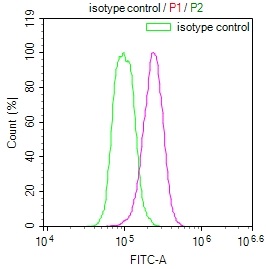ACSL1 Antibody, FITC conjugated
-
中文名稱:ACSL1兔多克隆抗體, FITC偶聯
-
貨號:CSB-PA001191LC01HU
-
規格:¥880
-
其他:
產品詳情
-
產品名稱:Rabbit anti-Homo sapiens (Human) ACSL1 Polyclonal antibody
-
Uniprot No.:
-
基因名:
-
別名:ACSL1; FACL1; FACL2; LACS; LACS1; LACS2; Long-chain-fatty-acid--CoA ligase 1; Acyl-CoA synthetase 1; ACS1; Arachidonate--CoA ligase; Long-chain acyl-CoA synthetase 1; LACS 1; Long-chain acyl-CoA synthetase 2; LACS 2; Long-chain fatty acid-CoA ligase 2; Palmitoyl-CoA ligase 1; Palmitoyl-CoA ligase 2; Phytanate--CoA ligase
-
宿主:Rabbit
-
反應種屬:Human
-
免疫原:Recombinant Human Long-chain-fatty-acid--CoA ligase 1 protein (435-547AA)
-
免疫原種屬:Homo sapiens (Human)
-
標記方式:FITC
-
克隆類型:Polyclonal
-
抗體亞型:IgG
-
純化方式:>95%, Protein G purified
-
濃度:It differs from different batches. Please contact us to confirm it.
-
保存緩沖液:Preservative: 0.03% Proclin 300
Constituents: 50% Glycerol, 0.01M PBS, pH 7.4 -
產品提供形式:Liquid
-
儲存條件:Upon receipt, store at -20°C or -80°C. Avoid repeated freeze.
-
貨期:Basically, we can dispatch the products out in 1-3 working days after receiving your orders. Delivery time maybe differs from different purchasing way or location, please kindly consult your local distributors for specific delivery time.
-
用途:For Research Use Only. Not for use in diagnostic or therapeutic procedures.
相關產品
靶點詳情
-
功能:Catalyzes the conversion of long-chain fatty acids to their active form acyl-CoAs for both synthesis of cellular lipids, and degradation via beta-oxidation. Preferentially uses palmitoleate, oleate and linoleate. Preferentially activates arachidonate than epoxyeicosatrienoic acids (EETs) or hydroxyeicosatrienoic acids (HETEs).
-
基因功能參考文獻:
- These results suggest that ACSL1, ACSL4 and ACSL5 expression is regulated by ER signaling pathways and ACSL5 is a potential novel biomarker for predicting prognosis of breast cancer patients. PMID: 28498416
- Study identified a genetic variant in the 3'-UTR region of ACSL1 gene (rs8086) that may play a significant role in predicting outcomes of stage II/III patients with colon cancer, so that patients with T/T genotype had a significantly higher risk of tumor recurrence than those carrying at least one C allele. PMID: 27992526
- The mRNA levels of ACSL1 were positively associated with those of HBXIP in clinical breast cancer tissues. Thus, we conclude that the oncoprotein HBXIP is able to up-regulate ACSL1 through activating the transcriptional factor Sp1 in breast cancer. PMID: 28132807
- evidence in humans of ACSL1 SNPs associated with fasting glucose, diabetes, and subclinical atherosclerosis PMID: 26711138
- SRE motif in ACSL1 is essential for SREBP2-mediated activation of C-ACSL1 gene transcription. PMID: 26728456
- ACSL1 is a programmable mediator of insulin sensitivity and cellular lipid content. PMID: 25915184
- the cell surface protein CD36/FAT directly facilitates fatty acid transport across the plasma membrane, whereas the intracellular acyl-CoA synthetases FATP4 and ACSL1 enhance fatty acid uptake indirectly by metabolic trapping PMID: 24503477
- Data indicate that expression of miR-205 is negatively related to that of ACSL1 in clinical hepatocellular carcinoma (HCC) tissues. PMID: 24462768
- long-chain acyl-CoA synthetase 1 has a role in eicosapentaenoic acid suppression of palmitate-induced cytokine production PMID: 23433401
- Findings suggest that the ACSL1 gene polymorphism rs6552828 is not associated with elite endurance athletic status in Caucasians, yet a marginal association seems to exist for the Chinese (Han) male population. PMID: 22829935
- Data show that ACSL1 rs9997745 polymorphism influences metabolic syndrome risk, most likely via disturbances in fatty acid metabolism, which was modulated by dietary fat consumption, particularly PUFA intake, suggesting novel gene-nutrient interactions. PMID: 20176858
- Based on homology, two new isoforms for ACSL1 were predicted and characterized, one represented a switch of the Phe- to the Tyr-Gate domain motif, the other resulted from the exclusion of both. PMID: 16834775
顯示更多
收起更多
-
亞細胞定位:Mitochondrion outer membrane; Single-pass type III membrane protein. Peroxisome membrane; Single-pass type III membrane protein. Microsome membrane; Single-pass type III membrane protein. Endoplasmic reticulum membrane; Single-pass type III membrane protein.
-
蛋白家族:ATP-dependent AMP-binding enzyme family
-
組織特異性:Highly expressed in liver, heart, skeletal muscle, kidney and erythroid cells, and to a lesser extent in brain, lung, placenta and pancreas.
-
數據庫鏈接:
Most popular with customers
-
-
YWHAB Recombinant Monoclonal Antibody
Applications: ELISA, WB, IHC, IF, FC
Species Reactivity: Human, Mouse, Rat
-
Phospho-YAP1 (S127) Recombinant Monoclonal Antibody
Applications: ELISA, WB, IHC
Species Reactivity: Human
-
-
-
-
-



















